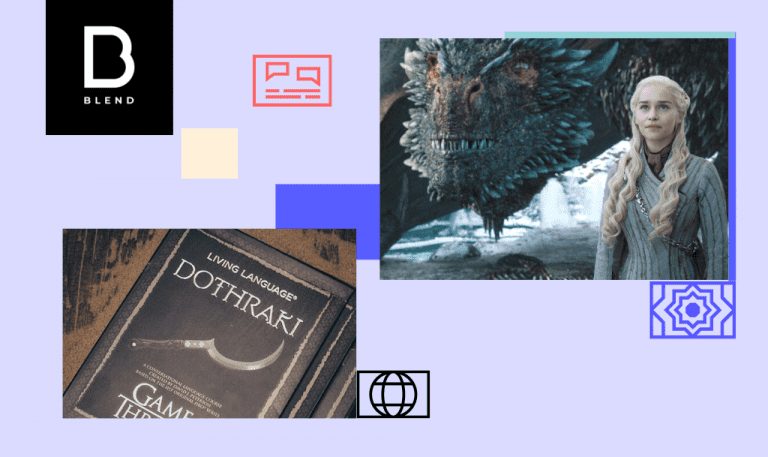Corinne Sharabi
Corinne is the Social Media and Content Lead at BLEND. She is dedicated to keeping global business professionals up to date on all things localization, translation, language and culture.


With the premiere of the long-awaited Game of Thrones prequel, House of the Dragon, coming this Sunday, August 21, we realized it was time to brush up on our GOT languages before re-entering the long winter.
That got us wondering. Why do films, TV shows, and video games feel the need to create their own languages instead of using existing languages? And what’s the language creation process like?
Linguists have estimated that 31,000 languages have existed in the history of humankind, a vast majority of which are already dead. Today, there are roughly 7,000 spoken languages.
With so many languages to choose from (both dead and alive), it’s interesting that creators of fantasy worlds, such as Game of Thrones, Lord of the Rings, and Star Trek to name a few, choose to undertake the difficult and lengthy process of developing their own languages.
Linguist David J. Peterson built two of the languages from Game of Thrones, Valyrian and Dothraki, nearly from scratch. Peterson created grammar structures, translations, and cultural phrases in a short window of time, using just a few short phrases included in the original novels by George R.R. Martin.
Since language is representative of a group of people’s culture, environment, and daily life, it was important for Peterson to consider which words to create in each language. For example, the Dothraki language has a word for “pride” but does not have a word for “book,” which makes sense since the Dothraki are nomadic horse-mounted warriors.
Dothraki contains about 4,000 words and Valyrian has roughly 2,000 words. While a small number compared to approximately 470,000 words in the English language, these fictional languages have still proven themselves impactful. In fact, popular language learning app Duolingo even offers a course in High Valyrian. In 2019, over 1.2 million users started the course!
And how can we forget that one time Khal Drogo himself, also known as Jason Momoa, spoke unscripted Dothraki in a talk show interview with Graham Norton. The GOT cast has testified first-hand that they had many hours of language classes in order to deliver their lines naturally during filming.
What can we expect from House of the Dragon? Besides lots of dragons, we can guess that Dothrakis will not feature since the series is set two centuries earlier than Game of Thrones. Valyrian, on the other hand, should continue as one of the main languages. The plot line revolves around the House of Targaryen but features the other houses as well, so we can’t wait to find out which languages the new characters will be speaking.
Two centuries, though, is a long time for groups of people and their languages to evolve. It will be interesting to see if Peterson and the creators behind House of the Dragon chose to change Valyrian or use a new dialect to reflect the earlier time period.
Winter is finally returning, and we, for one, can’t wait to get lost in the wonderful world of the seven kingdoms. Good fortune, everyone!
Want to offer your product or service to new markets in foreign languages? Contact us for professional localization and translation in 120+ languages (not including Valyrian…at least not yet!)
What our customers are saying